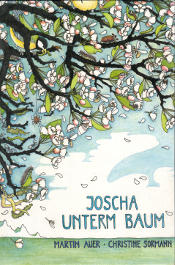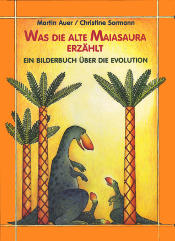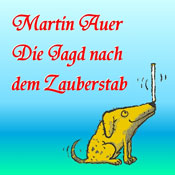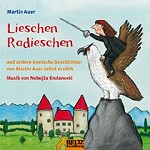Martin Auer: The Strange War, Stories for Peace Education

The Farmers who Were Good at Numbers
Please share if you want to help to promote peace!
Translated by Kim Martin Metzger
Reviewed by Martin Auer
Bücher und CDs von Martin Auer

In meinem Haus in meinem Kopf
Gedichte für Kinder

Die Prinzessin mit dem Bart
 Joscha unterm Baum
Joscha unterm Baum

Was die alte Maiasaura erzählt

Die Erbsenprinzessin

Der wunderbare Zauberer von Oz - Hörbuch zum Download

Die Jagd nach dem Zauberstab, Roman für Kinder - Hörbuch zum Download
 Der seltsame Krieg
Der seltsame KriegGeschichten über Krieg und Frieden

Zum Mars und zurück - Lieder
 Lieblich klingt der Gartenschlauch - Lieder
Lieblich klingt der Gartenschlauch - Lieder

Lieschen Radieschen und andere komische Geschichten - CD
Among the places the mullah Nasreddin Hodja visited in his travels, was a village whose citizens were known for being especially good at numbers. Nasreddin found lodging at a farmer’s house. The next morning Nasreddin found out that the village had no well. In the morning, someone from every family in the village loaded one or two donkeys with empty water jugs, and then went off to a stream that was an hour’s walk away, filled the jugs, and brought them back again, which took another hour.
"Wouldn’t it be better if you had water in the village," the hodja asked the farmer he was staying with.
"Oh, much better," said the farmer. "Every day the water costs me two hours of work for a donkey and a boy who drives the donkey. That comes to 1,460 hours per year, if you count the donkey as equal to the boy. If the donkey and the boy were working in the fields during this time, I could, for example, plant a whole field of pumpkins and harvest an additional 457 pumpkins every year."
"I see you’ve got everything nicely figured out," said the hodja, admiringly. "Then why not dig a canal to bring the water to the village?"
"That’s not so simple," said the farmer. "There’s a hill in the way, which we’d have to dig up and remove. If I used my boy and donkey to dig a canal instead of sending them for water, it would take them 500 years, if they worked two hours a day. I’ve got maybe thirty more years to live, so it’s cheaper for me to have them fetch the water."
"Yes, but would it be your responsibility alone to dig a canal? There are many families in this village."
"Oh, yes," said the farmer, "there are exactly 100 families. If every family sent a boy and a donkey every day for two hours, then the canal would be finished in five years. And if they worked ten hours every day, it would be finished in one year."
"So why don’t you speak to your neighbors and suggest that all of you dig the canal together?"
"Well, if I have an important matter to discuss with a neighbor, I invite him to my house, serve him tea and halvah, talk to him about the weather and the prospects for the next harvest, then about his family, about his sons, daughters, and grandchildren. Then I have a meal served to him and after dinner we have tea again. Then he asks me about my farm and about my family, and then we get to the matter at hand nice and slowly. That takes a whole day. Since there are 100 families in our village, I would have to speak to 99 heads of household. You have to admit that I can’t afford to spend ninety-nine days in a row having these discussions. My farm would go to rack and ruin. The best I could do is to invite a neighbor once a week to my house. Since a year only has fifty-two weeks, that means it would take almost two years to talk to all my neighbors. If I know my neighbors, every one would finally agree that it would be better to have water in the village because they are all good with numbers. And if I know them, every one of them would promise to join in if the others joined in too. So, after two years I would have to start all over again. I’d have to invite them to my house and tell them that the others have also agreed to join in."
"Fine," said the hodja, "but after four years you would be ready to start the work. And after one more year, the canal would be completed!"
"There’s one more complication," said the farmer. "You’ll admit that once the canal has been dug, everybody will be able to fetch water from it, whether he did his share of the work or not."
"That’s right," said the hodja. "Even if you wanted to, you couldn’t guard the whole length of the canal."
"Exactly," said the farmer. "So someone who was a slacker would have the same benefit from the canal as the others, but without the cost."
"I have to admit that," said the hodja.
"So everyone who is good at numbers will try to shirk his duty. One day it’ll be a lame donkey. Another day someone’s boy will have a cough. And then someone’s wife will be ill, and the boy and the donkey will be needed to fetch the doctor. But in our village, everyone is good at numbers, so everyone will try to get out of doing his share. And since every one of us knows that the others won’t pitch in, no one will send his donkey and his boy to work. So the canal won’t even be started."
"I have to admit that your arguments sound very convincing," said the hodja. He brooded for a while, then he suddenly called out, "But I know a village on the other side of the mountains that had exactly the same problem as you have. But they’ve had a canal for twenty years."
"Right," said the farmer, "but they aren’t good at numbers."
Author's comments
This site has content self published by registered users. If you notice anything that looks like spam or abuse, please contact the author.
